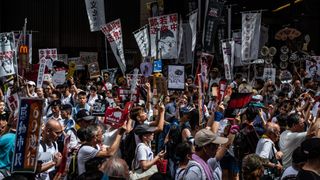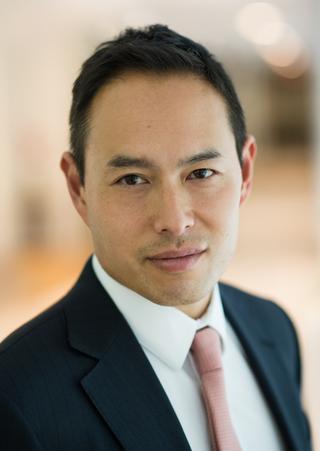The Chinese Communist Party political narrative of how one achieves national cohesion is based on three tenets: citizens are materialistic beings who value only material things; centralised and authoritarian rule is best placed to deliver stability and order; and only coercion can stave off chaos and discord when dealing with malcontent populations.
Events in Hong Kong show this narrative is self-serving, delusional and counterproductive.
As a result, the party is facing diabolic dilemmas and problems of its own making.
Although an estimated million people from a territory of 7.3 million people took part in one protest on June 9 alone, Beijing has dismissed many of them as radicals committing violent crimes. How best to respond to these criminals? They will be punished severely and without hesitation.
The protests, which began in March, were initially triggered by discontent about the introduction of a bill that would allow people in Hong Kong to be extradited to China at the latter’s request. Protesters have since voiced other grievances such as the broken promise of genuine universal suffrage (Beijing maintaining its ability to hand-pick the chief executive and other candidates), police violence, political prisoners and the systematic erosion of political and individual freedoms promised by China in its 1984 treaty with the United Kingdom and which is enshrined in its Basic Law.
How does Beijing frame the problem? Could it be that Hong Kongers really do want to preserve the way of life left behind to them by the British? Impossible.
In an unprecedented news conference late last month, the Communist Party’s Hong Kong and Macao Affairs Office blamed Western forces and foreign ideas for fomenting trouble. But the apparent good news for Beijing is that many could be saved from these mischievous ideas if granted greater economic opportunity and more affordable housing.
Although an estimated million people from a territory of 7.3 million people took part in one protest on June 9 alone, Beijing has dismissed many of them as radicals committing violent crimes. How best to respond to these criminals? They will be punished severely and without hesitation.
And if that doesn’t work, the Chinese Defence Ministry has indicated it is open to using the military to impose order if requested by its hand-picked chief executive and her deputies on the island.
The Communist Party ought to know that taming a population by a combination of material incentives and coercion to deliver order and stability is a sham. Since 2007, China’s annual spending on domestic security — which includes a million-strong People’s Armed Police — has tripled to about $300 billion, which is one-fifth more than it spends on the People’s Liberation Army. In Xinjiang, the increase has been more than ten-fold, from $1.15 billion in 2007 to more than $12 billion by the end of last year. The other two regions with similar increases in domestic security spending are Tibet and Qinghai Province, where one-quarter of the population is Tibetan.
But the carrots and sticks of economic growth and increased coercion and repression do not deliver order or stability when citizens are not permitted to live the way in which they choose or are accustomed.
Largely as a result of state-directed investment, economic growth in both Tibet and Xinjiang was about 9 per cent last year — well above the national average of about 6.5 per cent. But the carrots and sticks of economic growth and increased coercion and repression do not deliver order or stability when citizens are not permitted to live the way in which they choose or are accustomed.
Indeed, these regions have become even more restive over time because of the Marxist-Leninist intolerance of pluralism and anything falling short of subservient devotion to the CCP.
In important respects, Hong Kong is a far more complicated problem for Beijing. The placing of an estimated million Uighurs into detention and re-education camps in Xinjiang has not sparked the degree of international outrage it deserves because there are few reporters and cameras on the ground. In contrast, Hong Kong is one of the world’s most international cities. Any brutal crackdown in full view of the world would be disastrous for China’s standing and the island’s status as a global financial centre. A financial catastrophe and exodus precipitated by violence committed by Chinese authorities would be a humiliation for the party and perhaps even an existential political moment for Xi Jinping.
Conversely, acceding to the demands of protesters will raise fears that doing so will only embolden protesters in Hong Kong and elsewhere. The recent chants of “reclaim Hong Kong” and “revolution of our time” would have struck fear in the hearts of every Politburo member. Either way, Beijing’s false claim that it offers a better approach to national cohesion has been exposed. Significant numbers of richer and poorer residents throughout its provinces and regions remain restless and afraid but defiant.
The likelihood is that there will continue to be only ritual democracy in Hong Kong in that the people can vote but the leaders must first secure Beijing’s approval. In the best-case scenario, the erosion of freedoms and liberties could be halted temporarily.
China might eventually get its way with Hong Kong but a greater prize has become even more elusive. It has long held up Hong Kong as proof it was sincere in offering Taiwan significant autonomy and even permission to retain its own armed forces under a special “one country, two systems” deal with Taipei upon unification. Developments in Hong Kong ends any chance Taipei will take Beijing at its word.
Indeed, Taiwan’s President Tsai Ing-wen, who openly supported the pro-democracy protests in Hong Kong and is advocating for greater distance from Beijing, has seen her popularity boosted. At the same time, the stocks of the opposition Kuomintang Party and other more pro-China candidates have fallen.
The Communist Party needs a new narrative, a new approach to national cohesion, and a different approach to winning the hearts and minds of those it seeks to rule.






